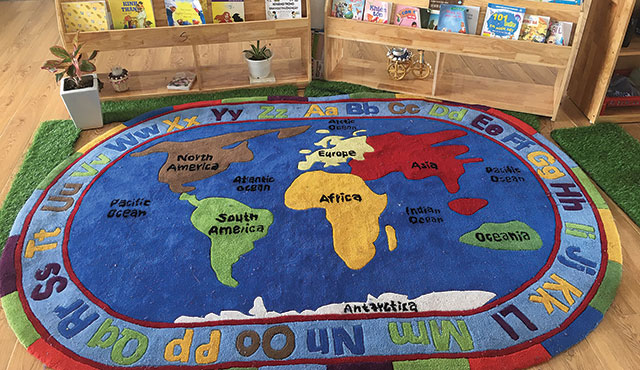Editor’s Note: This is the second story in a series about the relationship between the Diocese of Orange and the Catholic community in Vietnam.
Thai Binh Province, Vietnam – About halfway between Vietnam’s capital city and the edge of South China Sea sits a rural area home to rice fields, auto part factories and a modern school preparing young students for a bright future.
The newly built school rises next to a Catholic convent of nuns, the Dominican Sisters of Thai Binh, many of whom work there as teachers. Opened in October, Binh Minh Preschool of Thai Binh enrolls about 130 students from mostly low-income households and is supported with funding by Companions in Grace, an Orange County Catholic nonprofit.
“This is one of the best schools in Vietnam,” said Minh Nguyen, a retired engineer and Orange County resident who supports educational initiatives in Vietnam through Companions in Grace. “Parents want their children to go to school here.”
Nguyen started Companions in Grace to find peaceful, effective solutions to complex problems in Vietnam, like breaking cycles of poverty and ensuring children from poor families move up in social status.
“We can solve problems and transform the system by giving children access to a quality Catholic education,” Nguyen said.
The nonprofit’s first major project is the Binh Minh Preschool.
Parents arrive by motorbike around 6 a.m. to drop their children off. Each student is greeted by a nun who holds their backpack and walks with them to class. The simple ritual is the start of a school day that, for many children, will stretch to 5 p.m.
On a recent morning, outside a brightly lit classroom on the school’s second level, children’s sandals and sneakers were neatly placed on wood shelves. Inside, students sat at tables working on math problems. Art covered bulletin boards fixed to the walls – drawings of animals with names written in Vietnamese and English next to crayon-colored maps of the globe.
Binh Minh Preschool exposes students to Western-style education methods in a Communist-run country experiencing rapid population growth. About 23 percent of the country’s 97 million inhabitants are under the age of 14, according to United Nations data.
Although Vietnam is experiencing booming economic growth, many residents struggle to pay tuition to send their children to good schools. Most workers in manufacturing and low-skilled jobs earn less than $250 per month, according to data from Trading Economics, an independent firm that tracks global economic trends. Many families with students at Binh Minh receive financial aid directly through the preschool and from Companions in Grace. Students’ parents work as farmers, mechanics and in the nearby factories.
“This is the Catholic Church working quietly in a part of the world that is often ignored, but needs great help,” said Cami Gienger, who fled Vietnam for the U.S. when she was 18, after the Fall of Saigon in 1975, and financially supports the school. “Life in Vietnam can be difficult. But if students have access to a quality education, they will be able to handle anything.”
Western-style education
Classroom curriculum at Binh Minh Preschool is based on the Montessori Method of Education, which focuses on problem solving, critical thinking and individual learning. Nguyen helped create the school, modeling its curriculum and learning principles on St. Columban Catholic School in Garden Grove.
“We saw the success St. Columban School was having, and we wanted to replicate it here,” Nguyen said.
Students learn to read and write in English, are exposed to basic science concepts to develop an appreciation for the natural world and are encouraged to express themselves through art.
“This is a new method of teaching in Vietnam,” said Sr. Maria Mai Diep, who teaches at the school. “Students are being introduced to English and given opportunities to focus on problem solving – which requires them to pay attention. We see that students are more focused through the day.”
The school operates in a country where curriculum is overseen by a sprawling state-run educational system. Although occurring more frequently, the opening of independent, Western-style schools, like Binh Minh Preschool, remains relatively rare.
Like a second home
The students spend much of their time at the school – typically 11 hours a day, six days a week. Hot meals are prepared fresh by the nuns in the school’s kitchen. Classrooms are bright, organized and clean. Bookshelves are lined with titles in Vietnamese and English. Teachers work with students individually and in small groups.
“We want to help them develop their curiosity, solve problems and think for themselves,” Nguyen said. “The teachers are their guides.”
Each classroom has about 30 students with students ranging in age from about 1 to 5 years old, and three teachers, who are each educated and trained at a professional school in Hanoi, Vietnam’s capital. Through financial help from Companions in Grace, six nuns have been trained as teachers to work specifically at the preschool.
On a recent morning, Gienger sat in a chair in the middle of a classroom. Students gathered around her, sitting cross-legged on the floor as she read a story in English. The students repeated each sentence.
The school represents a direct improvement in the lives of the students and their families, Gienger said.
“The school is empowering students to think for themselves,” she added. “The education they receive here represents a significant investment into their lives, their community and their country.”
Along with positioning children for future educational success, the preschool sets a foundation for students to be a part of a skilled workforce and succeed in the 21st century.
“They will have to compete in a global economy,” Nguyen said. “We want to introduce them to the world.”
To learn more about Binh Minh Preschool and Companions in Grace, visit companionsingrace.org


